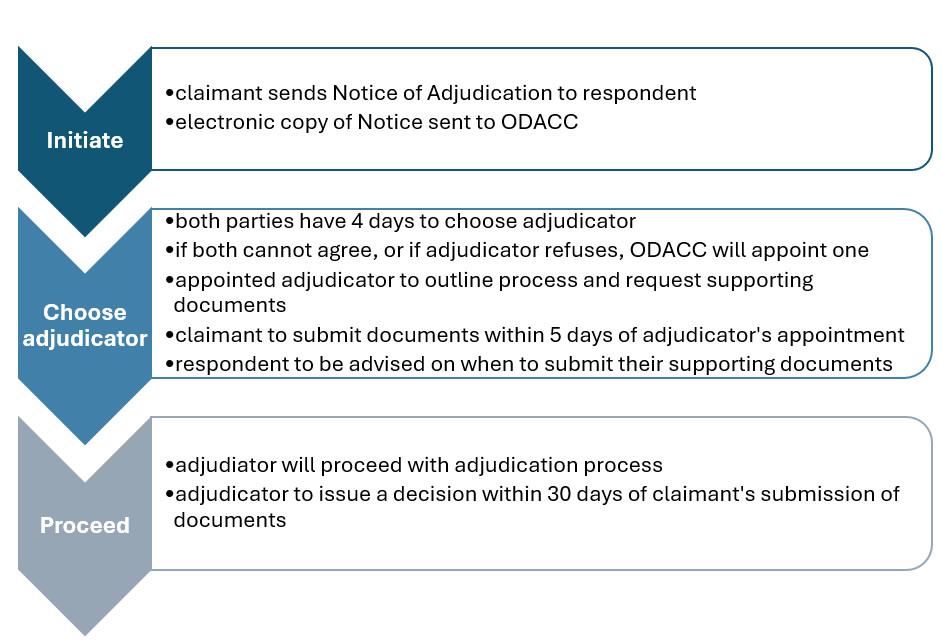The popularity of the different modes of alternative dispute resolution has been growing over the past years, and the construction industry has been one of its frequent users. Not only because of its practicality, but also because of the recent changes in the law. An example is found in Ontario’s Construction Act adjudication provisions and that of other provinces.
What is construction adjudication?
Canada’s construction laws have set up their own adjudication proceedings, such as Ontario’s Construction Act adjudication provisions. This process helps resolve conflicts among parties to a construction project without going to court.
An adjudication is one of the methods of alternative dispute resolution, where an adjudicator is called by the parties who will decide on the issue presented to them. The adjudicator must be a neutral third party, who has more of a judge-like authority to decide the case.
The Construction Act adjudication provisions outline:
- selection and powers of the nominating authority
- selection and qualifications of an adjudicator
- process of conducting an adjudication
- process of appealing the decision of the adjudicator
For this article, we’ll be using the Construction Act adjudication process of Ontario. For more information on the other construction laws of other provinces, head over to our Legal FAQs page.
Watch this video from the Ontario Dispute Adjudication for Construction Contracts (ODACC) to know about its role:
You may also consult with one of the Lexpert-ranked best construction lawyers in Ontario for more on the province’s Construction Act adjudication provisions.
Canada’s construction laws
Every jurisdiction in Canada has its own law on the relationship between a project owner and their builder (e.g., contractor, subcontractor, supplier, labourer). Here are other examples of these laws:
- Alberta: Prompt Payment and Construction Lien Act
- British Columbia: Builders Lien Act
- Manitoba: The Builders' Liens Act
- Northwest Territories: Mechanics Lien Act
- Saskatchewan: The Builders' Lien Act
In Québec, a construction lien is called legal construction hypothec and is governed by the province’s Civil Code.
These laws commonly outline:
- establishing deadlines for a system of prompt payment
- requiring holdbacks for payments on a construction project
- creation of a builder’s lien in case of non-payment
- arbitration or adjudication process for construction disputes
What is the procedure for adjudication of construction disputes?
Here’s a summary of what happens during an adjudication of a construction dispute under the Construction Act’s adjudication provisions:
1. Initiating the adjudication process
A party (the claimant) notifies the other party (the respondent) with a Notice of Adjudication; the respondent must act on the Notice.
A similar notice is sent electronically to the ODACC, the appointing authority in Ontario.
2. Choosing the adjudicator
Both parties have 4 days to select an adjudicator. If the parties cannot agree on an adjudicator or if the adjudicator refuses, the claimant must send ODACC a request to appoint an adjudicator. ODACC will appoint an adjudicator within seven days of receiving the request.
When the adjudicator has been appointed, they will relay the adjudication process to both parties and will request supporting documents.
Claimant must submit their supporting documents within five days of the adjudicator's appointment. Respondent will be notified by the adjudicator of when they should submit their supporting documents.
3. Proceeding with adjudication
The adjudication will progress following the process agreed by the parties, or depending on what the adjudicator thinks is appropriate.
The adjudicator may:
- conduct an on-site inspection of the subject property
- do online or in-person hearings
- decide based only on the supporting documents submitted by both parties
The adjudicator will decide within 30 days from when the claimant submitted supporting documents.
Here’s a summary of the Construction Act adjudication process:

Types of disputes eligible for adjudication
Parties in a construction contract may agree on what issues that will surface in the future may undergo adjudication for it to be resolved. Aside from these contractual provisions, the law also specified the matters that can be submitted for adjudication, such as:
- valuation of the services or materials under the construction contract
- payment or non-payment, including those that are related to a change order
- disputes related to a proper invoice
- disputes related to set-offs by trustees or lien set-offs
- non-payment of holdbacks
Appealing the decision of an adjudicator
Ontario’s Construction Act adjudication process allows a party to appeal the decision of an adjudicator. The law says that although parties may appeal the adjudicator’s decision, it will be binding between the parties until:
- a later decision is made by a court or after an arbitration proceeding; or
- the parties entered in a written agreement to resolve the matter
Otherwise, the parties must adhere to the ruling made by the adjudicator, as it’s valid and binding against them.
Judicial review of the adjudicator’s decision
The Act is also clear that an application to submit an adjudicator’s decision to judicial review must be made with approval from the Divisional Court. The application must be filed within 30 days after the adjudicator’s decision has been communicated to the parties.
The mere filing of the application for judicial review will not prevent the operation of the adjudicator’s decision. As such, only when the court orders otherwise can the decision can be set aside or prevented from its operation.
The law also lists the grounds when can a party ask the court to set aside the decision of the adjudicator:
- legal incapacity of the appealing party during the adjudication process
- invalidity or expiration of the construction contract or subcontract
- the issue that was determined cannot be adjudicated under the law
- adjudication was conducted by a non-adjudicator
- the process of adjudication under the law was not followed
- bias on the part of the adjudicator
- the determination was the result of fraud
Enforcing the adjudicator’s decision
The adjudicator’s decision may be enforced with the help of the court. For this, any of the parties to the dispute may file with adjudicator’s decision to the court within two years from:
- the adjudicator’s decision was communicated to the parties; or
- the application for judicial review of the adjudicator’s decision was dismissed; or
- the adjudicator’s decision was not set aside after its judicial review
What are the advantages and disadvantages of adjudication in construction?
Adjudication may have advantages for the conflicting parties in construction projects or contracts. These may also depend on the nature of the dispute and the parties themselves.
Advantages of adjudicating of construction disputes
Here are some advantages of adjudication that parties can think about when deciding whether it’s for them or not:
- alternative to litigation: ideally, it’s a faster and cheaper alternative to court proceedings
- control over the proceedings: parties can suggest to the adjudicator the process of the adjudication
These advantages are also like that of alternative dispute resolution methods that parties to a construction project may also use to resolve their conflicts.
Disadvantages of adjudicating construction disputes
There are also some downsides when parties in a construction project adjudicate their issue instead of other legal methods, such as going to court:
- another layer of legal process: for the losing party, it might be just another hurdle especially if they prefer it to be resolved by a court
- an interim decision: the adjudicator’s decision is not final, since it may still be appealed before the court
With these pros and cons, it’s important to look at the complexity of the issue and the stakes involved when deciding to go through adjudication. It’s important to seek the advice of construction lawyers for this matter.
Learn more about the Construction Act adjudication process by consulting with the best construction lawyers in Canada as ranked by Lexpert.
Related articles:





